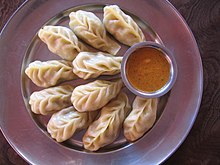momo
Jump to navigation
Jump to search
See also: Appendix:Variations of "momo"
English
[edit]Pronunciation
[edit]Etymology 1
[edit]
From Tibetan མོག་མོག (mog mog), from Mandarin 饃饃/馍馍 (mómo).
Noun
[edit]momo (plural momos or momo)
- A type of dumpling from Nepal, Ladakh or Tibet made with a simple flour and water dough and filled with meat, vegetables or cheese.
- 2007 July 1, “Far East of the U.N.”, in New York Times[1]:
- Many dishes show a direct influence of China or India; for example, momos, or Tibetan dumplings, look like Chinese pot-stickers.
- (India, slang, offensive) A person from Northeast India.
- 2017 May 23, Alana Golmei, “Let’s talk about racism”, in Hindustan Times, Delhi:
- Since I come from the North-eastern part of India myself and belong to a minority race, I too have suffered from racism, at least in its milder forms. I’ve been called "chinky", "momo", "chowmein", and more.
- 2021 June 9, “Northeast Indians DISRESPECTED once again with 'momo' slur”, in India Today Northeast:
- Now, it is a well-known fact that many Northeast Indians are derogatorily called 'momos' after the dish by mainland Indians for their round-ish features.
Alternative forms
[edit]Translations
[edit]type of dumpling
|
Etymology 2
[edit]Clipping and reduplication of moron.
Noun
[edit]momo (plural momos)
- (US, slang, derogatory) A moron.
- 1995, Nicholas Pileggi, Martin Scorsese, Casino, spoken by Ace (Robert De Niro):
- The probability on one-four-reel machine is a million and a half to one. On three machines in a row, it's in the billions. It cannot happen… would not happen, you fuckin' momo!
Further reading
[edit] Momo (food) on Wikipedia.Wikipedia
Momo (food) on Wikipedia.Wikipedia - “momo n.”, in Green’s Dictionary of Slang, Jonathon Green, 2016–present
- Eric Partridge (2005) “momo”, in Tom Dalzell and Terry Victor, editors, The New Partridge Dictionary of Slang and Unconventional English, volume 2 (J–Z), London, New York, N.Y.: Routledge, →ISBN, page 1310.
Adangme
[edit]Adverb
[edit]momo
Äiwoo
[edit]Verb
[edit]momo
- to chew (in order to swallow)
See also
[edit]References
[edit]- Ross, M. & Næss, Å. (2007) “An Oceanic origin for Äiwoo, the language of the Reef Islands?”, in Oceanic Linguistics, volume 46, number 2. Cited in: "Äiwoo" in Greenhill, S.J., Blust, R., & Gray, R.D. (2008). The Austronesian Basic Vocabulary Database: From Bioinformatics to Lexomics. Evolutionary Bioinformatics, 4:271–283.
Hopi
[edit]Etymology
[edit](This etymology is missing or incomplete. Please add to it, or discuss it at the Etymology scriptorium.)
Noun
[edit]momo (plural momòot)
Derived terms
[edit]References
[edit]- Albert, Roy, Shaul, David Leedom (1985) A Concise Hopi and English Lexicon, John Benjamins Publishing Company, page 40
- Hopi Dictionary Project, The (1998) Hopi Dictionary: Hopìikwa Lavàytutuveni: A Hopi Dictionary of the Third Mesa Dialect with an English-Hopi Finder List and a Sketch of Hopi Grammar, Tucson: The University of Arizona Press, page 244
Japanese
[edit]Romanization
[edit]momo
Kholosi
[edit]Etymology
[edit]From Sanskrit माम (māma, “uncle”).
Noun
[edit]momo m
- (family) maternal uncle
References
[edit]- Eric Anonby, Hassan Mohebi Bahmani (2014) “Shipwrecked and Landlocked: Kholosi, an Indo-Aryan Language in South-west Iran”, in Cahier de Studia Iranica xx[3], pages 13-36
Maori
[edit]Noun
[edit]momo
Further reading
[edit]Portuguese
[edit]Pronunciation
[edit]
- Hyphenation: mo‧mo
Noun
[edit]momo m (plural momos)
Spanish
[edit]Etymology
[edit]Uncertain:
- from Vulgar Latin *mōmus, from Ancient Greek Μῶμος (Mômos, “god of satire and mockery”), from μῶμος (mômos);
- from an imitative Proto-Germanic root, whence Dutch mom (“mask”), German Mumme (“mask”) - see mummer.
- from Old French momer (“to wear a mask”), related to momon (“mask”), from an child's word expressing astonishment. Compare English mum.[1]
Cognate to Portuguese momo, Aragonese momo, Catalan mom, French momon (“mask”).
Pronunciation
[edit]Noun
[edit]momo m (plural momos)
References
[edit]Further reading
[edit]- “momo”, in Diccionario de la lengua española, Vigésima tercera edición, Real Academia Española, 2014
Tagalog
[edit]Etymology
[edit]From apparent reduplication of the first syllable of multo.
Noun
[edit]momo (Baybayin spelling ᜋᜓᜋᜓ)
- Alternative form of mumo
Categories:
- English 2-syllable words
- English terms with IPA pronunciation
- English terms with audio links
- English terms borrowed from Tibetan
- English terms derived from Tibetan
- English terms derived from Mandarin
- English lemmas
- English nouns
- English countable nouns
- English nouns with irregular plurals
- English indeclinable nouns
- English terms with quotations
- Indian English
- English slang
- English offensive terms
- English reduplications
- American English
- English derogatory terms
- en:Foods
- Adangme lemmas
- Adangme adverbs
- Äiwoo lemmas
- Äiwoo verbs
- Hopi lemmas
- Hopi nouns
- hop:Insects
- Japanese non-lemma forms
- Japanese romanizations
- Kholosi terms inherited from Sanskrit
- Kholosi terms derived from Sanskrit
- Kholosi lemmas
- Kholosi nouns
- Kholosi masculine nouns
- Maori lemmas
- Maori nouns
- Portuguese 2-syllable words
- Portuguese terms with IPA pronunciation
- Portuguese lemmas
- Portuguese nouns
- Portuguese countable nouns
- Portuguese masculine nouns
- Spanish terms with unknown etymologies
- Spanish terms inherited from Vulgar Latin
- Spanish terms derived from Vulgar Latin
- Spanish terms derived from Ancient Greek
- Spanish onomatopoeias
- Spanish terms derived from Proto-Germanic
- Spanish terms derived from Old French
- Spanish 2-syllable words
- Spanish terms with IPA pronunciation
- Rhymes:Spanish/omo
- Rhymes:Spanish/omo/2 syllables
- Spanish lemmas
- Spanish nouns
- Spanish countable nouns
- Spanish masculine nouns
- Tagalog lemmas
- Tagalog nouns
- Tagalog terms with Baybayin script